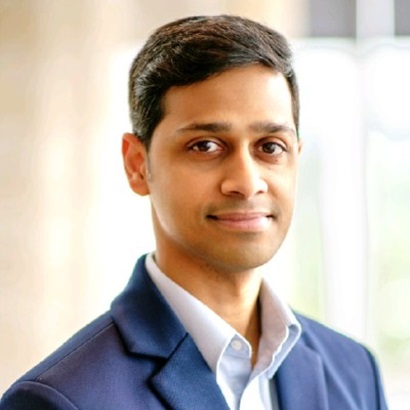
Can you walk us through your journey from Electrical Engineering at BITS to leading in marketing analytics? What inspired the transition, and how did your Master’s at Dartmouth help?
I’ve always loved problem-solving and was drawn towards business challenges early on at BITS. My Master’s in Engineering Management at Dartmouth was a good way for me, at the time, to transition into a business-focused role and gain valuable expertise in finance, marketing, strategy, and project management. It also provided exposure to studying and living abroad. From there I pursued consulting and analytical roles that involved building something new and providing the freedom to experiment. Over the years I held various analytical positions in sales, marketing, data science, loyalty, and revenue management leading up to my current role in marketing analytics.
What was your experience like applying to Dartmouth? What are some challenges you faced, and what do you think made your application stand out?
My experience applying to Dartmouth was similar to other universities. I was intentional about my choices, considering the time, effort, and cost involved. I emphasized how the university and the program would help me achieve my goals.
Which skills from your BITS days have helped you the most in your career, especially in analytics and management? Is there anything you wish you’d focused on more back then?
One of the most valuable skills I've gained from my time at BITS is the ability to break down complex problems into manageable parts systematically and to recognize that there are multiple paths to a solution. Another would be effective time management while handling multiple projects simultaneously. These skills have given me the confidence to tackle challenging projects and address issues that others might find intimidating.
For students wanting to get into analytics or marketing, what advice would you give about skills, internships, and further studies? How crucial is a graduate degree for this path?
Analytics is now a well-established field with plenty of opportunities for both theoretical and practical experience. My advice for students is to envision the roles that will emerge in the next five to ten years, particularly as AI becomes omnipresent and more prevalent in handling routine tasks. Consider how you would best position yourself to leverage all that AI has to offer.
While a graduate degree isn't critical, it can certainly help you stand out, especially if you use it to effectively articulate the insights behind the numbers and their implications for the business.
How did you adapt to the U.S. work culture after BITS? What differences or similarities stood out to you compared to working in India?
Adapting to the U.S. work culture was relatively easy for me, as I had only completed a couple of internships in India before starting my full-time career. I’ve been fortunate to work for companies and managers who prioritized a healthy work-life balance, which helped make the transition into the workplace smoother.
What’s a funny or unforgettable memory from your time at BITS that makes you laugh today?
Some of my fondest memories from BITS are of the time spent on and off campus with friends. One particularly unforgettable time was when the entire campus lost power, and we had to wait several days for the transformer to be fixed. It was quite the experience dealing with the summer heat and the lack of light and internet, especially as we were preparing for exams then!
Were you actively involved in any club/department? How have the skills you picked up from clubs/departments at K K Birla Goa Campus helped you in the real world?
Clubs and departments were just starting at the Goa campus during my time there, so I wasn’t involved much. However, I did participate in one of the first clubs, the Department of Photography.
How do you approach work-life balance in such a fast-paced, global role?
I try to compartmentalize work and home so that I don’t carry one stress over to the other. While that’s easier said than done, it helps me switch on and off into either mode. I do my best to manage work deliverables, set expectations, and communicate them as early as possible. I then spend my time where it’s most important and finish up noncritical tasks when it’s most convenient for me. Sometimes the work-life lines might blur and that’s ok as long as it’s for a short period and you plan for it.
If you could give your younger self one piece of advice while you were still at BITS, what would it be?
I would advise my younger myself to be more purpose-driven on where I spend my time and be more willing to go outside my comfort zone. This helps accelerate the speed of acquiring new skills.
What is something you believe was an essential skill for the real world but was not touched upon at all at college?
There are several skills that I had to learn and practice after college. Effective communication, networking, self-advocacy, negotiation, personal finance management, and investing are some that come to mind that I didn’t have enough exposure to when I was in college.
You Might Also Like
- Charting New Paths: From Physics to Finance — A Journey of Discovery with Harsh Vijay
- From BITS to Breakthroughs: A Journey of Innovation, Research, and Entrepreneurship in Drug Development and AI-Driven Healthcare
- Exploring Strategy and Growth: Insights from Kunal Gupta
- Crafting Memories and Managing Moments: Anupam Maurya’s Transition from BITS to KnotsbyAMP and Samaro.ai
- Exploring Jyotbir Singh’s Path and the Role of BITS Pilani in Shaping His Journey


 An Institute of Eminence
An Institute of Eminence






